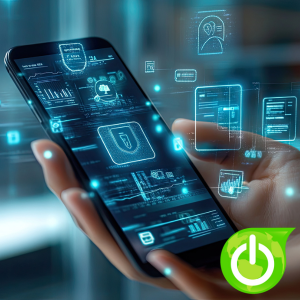 Apps are essential tools for productivity, entertainment, shopping, and to help people stay connected. But with millions of apps available, how can users make the most of their mobile experience while staying productive and secure? According to Asee, over 75% of published apps have at least one security vulnerability – that equates to 3 out of every 4 apps that are used! It is imperative to be careful when downloading and using apps. Whether you’re using iOS or Android, these mobile app tips will help you easily navigate app usage.
Apps are essential tools for productivity, entertainment, shopping, and to help people stay connected. But with millions of apps available, how can users make the most of their mobile experience while staying productive and secure? According to Asee, over 75% of published apps have at least one security vulnerability – that equates to 3 out of every 4 apps that are used! It is imperative to be careful when downloading and using apps. Whether you’re using iOS or Android, these mobile app tips will help you easily navigate app usage.
Download Apps from Trusted Sources
Always download apps from official app stores like the Apple App Store or Google Play Store. These platforms vet apps for malware and security risks. Avoid third-party sites, which may host malicious software disguised as legitimate apps.
Review App Permissions Before Installing
Before installing any app, check the permissions it requests. Does a weather app need access to your camera or contacts? Probably not. Grant only the permissions necessary for the app to function.
Read User Reviews and Ratings
User feedback can be incredibly helpful. Look for apps with high ratings and positive reviews. Watch out for complaints about bugs, crashes, or privacy issues.
Use a VPN on Public Wi-Fi
Public Wi-Fi networks are convenient but risky. Use a VPN (Virtual Private Network) to encrypt your data and protect your personal information when accessing apps on unsecured networks.
Keep Your Apps Updated
App updates often include security patches, performance improvements, and new features. Enable automatic updates or check manually to ensure you’re using the latest version.
Enable Two-Factor Authentication (2FA)
For apps that store sensitive data like banking or email, enable two-factor authentication. This adds an extra layer of protection beyond your password.
Customize App Settings for Better Experience
Many apps allow you to personalize settings such as notifications, themes, and privacy controls. Tailoring your app experience can improve usability and reduce distractions.
Understand the App’s User Journey
Apps are designed to guide users through specific actions. Understanding the user journey helps you navigate features more efficiently and avoid unnecessary steps.
Manage Push Notifications
Push notifications can be helpful but also overwhelming. Customize which alerts you receive and when. Turn off non-essential notifications to stay focused and reduce screen time.
Audit Your Apps Regularly
Review your installed apps every few months. Delete those you no longer use to free up space and reduce security risks. Unused apps can still access data or become outdated.
By following these mobile app best practices, users can enjoy a safer, smarter, and more personalized experience. Whether you’re downloading a new productivity app or managing your digital wallet, these tips will help you keep your personal information and assets safe.
